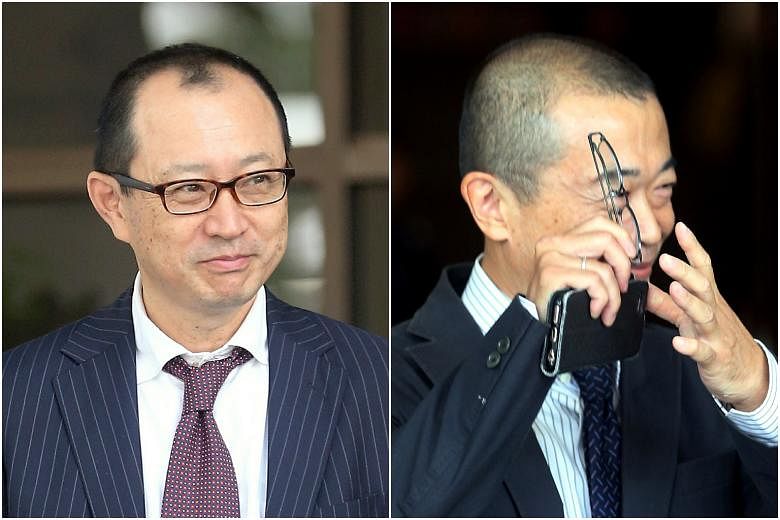SINGAPORE - To continue to be a distributor of edible flour, a Singaporean claimed he had to agree to a profit-sharing arrangement involving two Japanese men which saw them pocketing more than $2 million in bribes.
Mr Koh Pee Chiang continued paying Katsutoshi Ishibe, 53, and Takaaki Masui, 55, sums of money until his business faced financial problems. Court documents did not state Mr Koh's age.
On Thursday (June 7), the Japanese men were each sentenced to five years and six months' jail after District Judge Shaiffudin Saruwan found them guilty of 28 counts of corruption each in March at the end of a 13-day trial.
The judge also ordered Ishibe and Masui to each pay a penalty of $1,025,701, failing which, they will have to spend an additional six months behind bars.
The court heard that Mr Koh, the sole proprietor of Chia Lee & Co, claimed he had no choice but to agree to the arrangement.
His firm was the longstanding distributor of edible flour for the company the Japanese men worked for - Nissho Iwai International Singapore, and then Sojitz Asia after a merger in 2004.
In order to "support and protect" Chia Lee's edible flour business, Ishibe got Mr Koh to also sell industrial flour, but under a profit-sharing arrangement.
The deal, worked out some time in 2002, saw industrial flour being sold through Chia Lee to a firm called Chao Sun Trading for a profit margin of US$23 (S$30) per tonne.
Mr Koh was allowed to keep US$3 while the remaining US$20 was split between Ishibe and Masui.
The deal continued even after Ishibe, who initially was a manager of the foodstuff department of Nissho Singapore and Mr Koh's main contact point with the firm, eventually returned to Japan. Court documents did not state when this happened.
Masui then took over Ishibe's role. The profit-sharing arrangement was made without the knowledge of their company.
Deputy Public Prosecutors Jasmin Kaur and Loh Hui-Min said: "Mr Koh agreed to do this 'favour' for Ishibe as he wanted to ensure that his edible flour business would continue to run smoothly.
"He was worried and nervous that if he did not agree to do this 'favour', Ishibe would sell the edible flour to competing trading companies, which would, in turn, adversely affect Chia Lee's edible flour business."
Later on, each transaction garnered a higher profit margin, but Mr Koh continued to receive US$3.
This amount only just covered Mr Koh's costs and could not sufficiently cover the additional business tax which Chia Lee had to pay as the industrial flour business grew.
When he told the Japanese men about his concerns, and wanted to pull out of the arrangement, they threatened him, saying: "We will not continue to support and protect you any more."
Mr Koh felt that he had no choice but to continue with the industrial flour business or risk having his edible flour business being badly affected, the state's submission revealed.
By June 2005, Chia Lee did end up in grave financial difficulties.
Despite this, Mr Koh continued to pay the two men, out of concern for his edible flour business. The payments stopped only when Chia Lee's accounts were later controlled by Sojitz Japan.
On Thursday, defence counsel Sunil Sudheesan told the court that his clients, who no longer work for the Japanese firm, will be appealing against their conviction and sentence. They are now out on bail of $500,000 each.
Court documents did not state if any action is being taken against Mr Koh.

